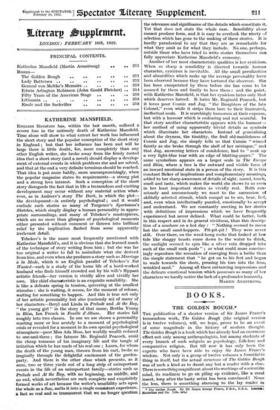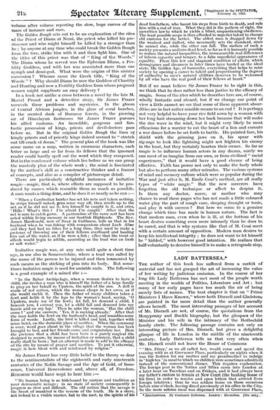BOOKS.
THE GOLDEN BOUGH.*
Tim publication of a shorter version of Sir James Frazer's tremendous work, The Golden Bough (the original version is in twelve volumes), will, we hope, prove to be an event of some magnitude in the history of modern thought. The Golden Bough is a book which has already had an enormous effect not only among anthropologists, but among students of every branch of such subjects as psychology, folk-lore and comparative religion. But till now it has only been the experts who have been able to enjoy Sir James Frazer's wisdom. Not only is a group of twelve volumes a formidable thing in itself, but the actual structure of The Golden Bough was of such a kind as to daunt any but a reader with a clue. There is something magnificent about the workings of a scientific mind, its readiness to go on piling up evidence, like a coral insect, long after the hasty artist has been convinced I None the less, there is something alarming to the lay reader in • The Goldea Bough. By Sir James George Frazer, F.R.S., F.B.A. London: Macmillan and Co. 118a. net)
volume after volume reporting the slow, huge curves of the
mass of instance and case.
The Golden Bough sets out to be an explanation of the rites of the Priest of Diana at Nemi, the priest who killed his pre- decessor and who might himself be killed by a stronger than he ; by anyone at any time who could break the Golden Bough from the tree, strike him with it and then fight him. One of the titles of this priest was that of " King of fr.e Woods."
The Diana whom he served was the Ephesian Diana, a Fer- tility Goddess, and with her was associated more than one nymph and demi-god. What were the origins of this sinister succession ? Whence came the Greek title, " King of the Woods " ? Why should Diana be now the Goddess of Chastity and Hunting and now a Fertility Goddess from whom pregnant women might supplicate an easy delivery ?
In a book not unlike a cross between a novel by the late M. Marcel Proust and a detective story, Sir James Frazer unravels these problems and mysteries. In the gloom of Central African jungles, in the glare of coral beaches, in the scented dusk of Burmese forests, in the piercing air of Himalayan fastnesses Sir James Frazer pursues his allied customs. An incredible, gorgeous and fan- tastic procession of kings, priests and devil-doctors pass before us. But in the original Golden Bough the lines of kingly priests and of priestly kings indeed seemed to " stretch out till crack of doom." The general plan of the book was like some nathe on a map, written in enormous characters, each letter so large and so far from its fellows that the ignorant reader could hardly spell out the word which they composed. But in the- condensed volume which lies before us we can grasp the masterly plan of the whole work ; the mind is fascinated by the author's skill as a constructive thinker and a framer of concepts, and also as a compiler of picturesque detail.
There are particularly delightful instances of imitative magic—magic, that is, where effects are supposed to be pro- duced by causes which resemble them as much as possible. A man wants a thing done, and he does it as nearly as he can :-
" When a Cambodian hunter has set his nets and taken nothing, he strips himself naked, goes some way off, then strolls up to the net as if he did not see it, lets himself be caught in it, and cries, Hillo ! What's this ? I'm afraid I'm caught.' After that the net is sure to catch game. A pantomime of the same sort has been acted within living memory in our Scottish Highlands. The Rev. James Macdonald, now of Reay in Caithness, tells us that in his boyhood when he was fishing with companions about Loch Alike and they had had no bites for a long time, they used to make a pretence of throwing one of their fellows overboard and hauling hiin out of the water, as if he were a fish ; after that the trout or silloeh would begin to nibble, according as the boat was on fresh or salt water."
Imitative magic was, at any rate until quite a short time ago, in use also in Somersetshire, where a toad was called by the name of the person to be injured and then tormented by such means as the sticking of pins into its body. But some- times imitative magic is used for amiable ends. The following is a good example of a mixed rite :—
" In the Babar Archipelago, when a woman desires to have a child, she invites a man who is himself the father of a large family to pray on her behalf to Upulero, the spirit of the sun. A doll is made of red cotton, which the woman clasps in her arms, as if she would suckle it. Then the father of many children takes a fowl and holds it by -the legs to the woman's head, saying, ' 0 Upulero, make use of the fowl ; let fall, let descend a child, I beseech you, I entreat you, let a child fall and descend into my hands and on my lap.' Then he asks the woman, Has the child come ? ' and she answers, ' Yes, it is sucking already.' After that the man holds the fowl on the husband's head, and mumbles some form of words. Lastly, the bird is killed and laid, together with some betel, on the domestic place of sacrifice. When the ceremony is over, word goes about in the village that the woman has been brought to bed, and her friends come and congratulate her. Here the pretence dud a child has been born is a .purely magical rite designed to secure, by means of imitation or mimicry, that a child really shall be born ; but an attempt is made to add to the efficacy of the rite by means of prayer and sacrifice. To put it otherwise, magic is here blent with and reinforced by religion."
Sir James Frazer has very little belief in the theory so dear to the sentimentalists of the eighteenth and early nineteenth centuries of the Noble Savage and the Age of Gold, of Inno- cence, Universal Benevolence and, above all, of Freedom.
Rousseau would have wept to hear him :—
" No human being is so hidebound by custom and tradition as your democratic savage ; in no state of society consequently is progress so slow and difficult. The old notion that the savage is the freest of mankind is the reverse of the truth. He is a slave, not indeed to a visible master, but to the Past, to the spirits of his dead forefathers, who haunt his steps from birth to death, and rule him with a rod of iron. What they did is the pattern of right, the unwritten law to which he yields a blind, unquestioning obedience. The least possible scope is thus afforded to superior talent to change old customs for the better. The ablest Man is dragged down by the weakest and dullest, who necessarily sets the standard, since he cannot rise, while the other can fall. The surface of such a society presents a uniform dead level, so far as it is humanly possible to reduce the natural inequalities, the immeasurable real differences of inborn capacity and temper, to a false superficial appearance of equality. From this low and stagnant condition of affairs, which demagogues and dreamers in later times have lauded as the ideal state, the Golden Age, of humanity, everything that helps to raise society by opening a career to talent and proportioning the degrees of authority to men's natural abilities deserves to be welcomed by all who have the real good of their fellows at heart."
But if we must believe Sir James Frazer to be right in this, we think that he does rather less than justice to the efficacy of magic. Some of the rites which he describes here are, of course, wholly fantastic and absurd, but if we change. our point of view a little cannot .we sec that some of these apparent absur- dities are in fact rather sensible means to an end ? It is perhapp not very helpful to have your rice field sown by a woman with her long hair streaming down her back because that will make the rice wave in the wind, but it might very likely be most efficacious for a warrior to eat the heart of a lion and execute a war dance before he set forth to battle. His painted face, his shield with the grinning jaws on it, his spear with zig-zags to look like lightning might not frighten his enemy in the least, but they certainly hearten their owner. So far as magic is to influence human actors in any drama, surely wo can most of us imagine from our own, or from civilized " racial experiences," that it would have a good chance of being effective. Faith has power not only to make the body whole but also to perform many other miracles. The various systems of mind and memory culture which were so popular during the War and just after it, M. Emile Coue's method, are all really types of " white magic." But the new sorcerers have, forgotten the old technique or affect to despise it. Is there any doctor, nurse, or mother who may chance to read these pages who has not made a little coloured water play the part of cough cure, sleeping draught or tonic, and play it with success ? But here we come to a genuine change which time has made in human nature. The fact is that modem man, even when he is ill, at the bottom of his heart desires something even more intensely than he does to be cured, and that is why systems like that of M. Cou6 meet with a certain amount of opposition. Modem man desires to keep his intellectual integrity ; he does not want to let himself be " kidded," with however good intention. He realizes that half-voluntarily to deceive himself is to make a retrograde step,



































































 Previous page
Previous page